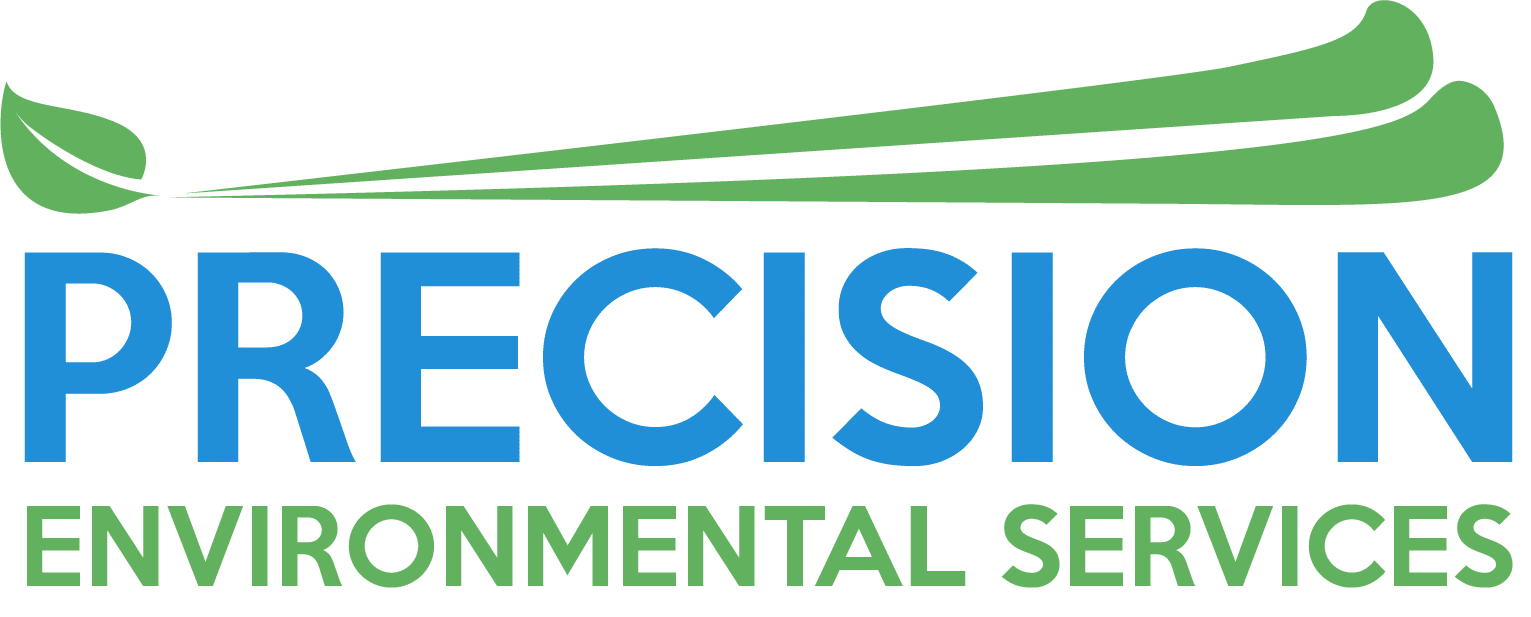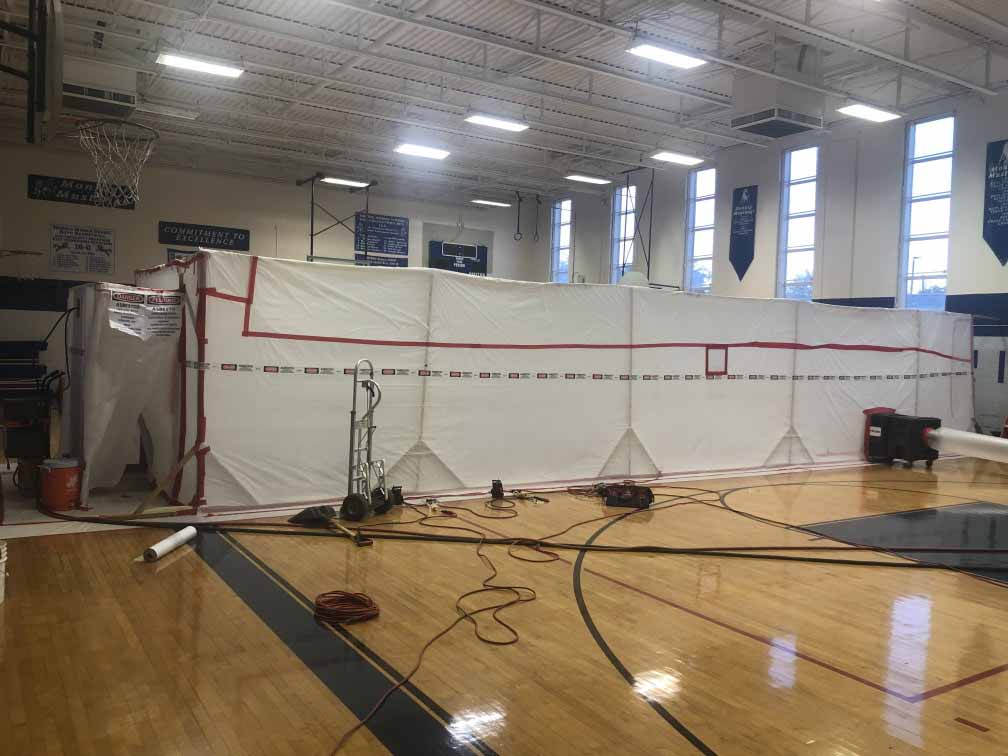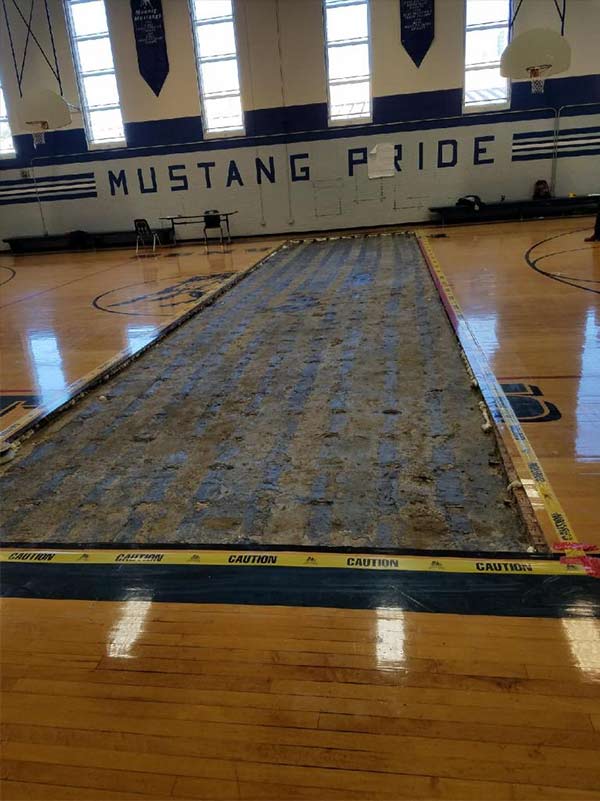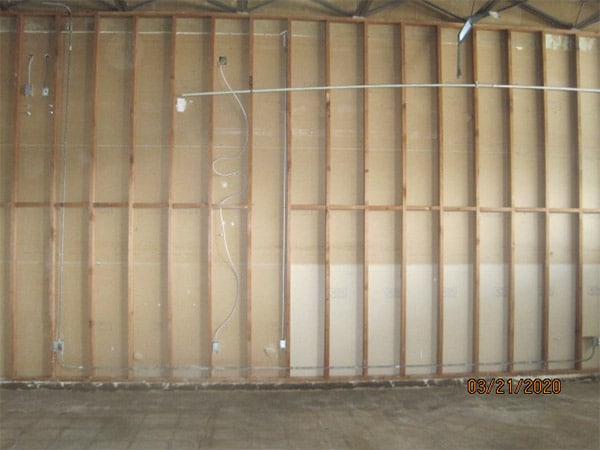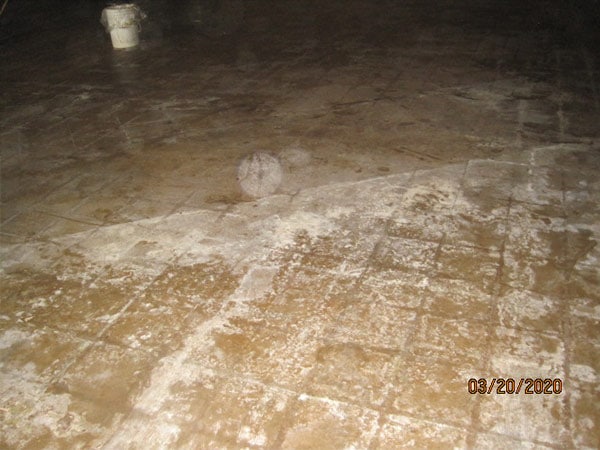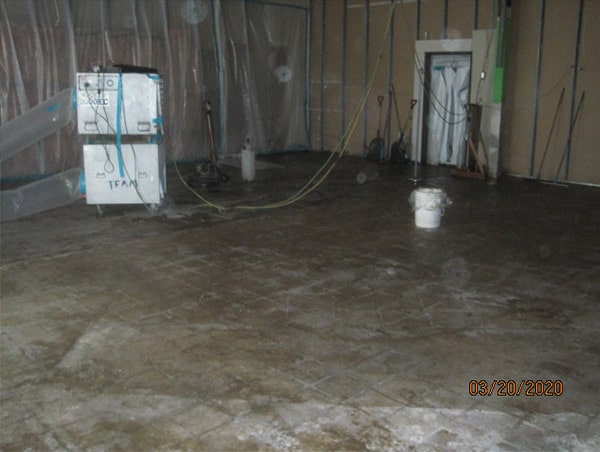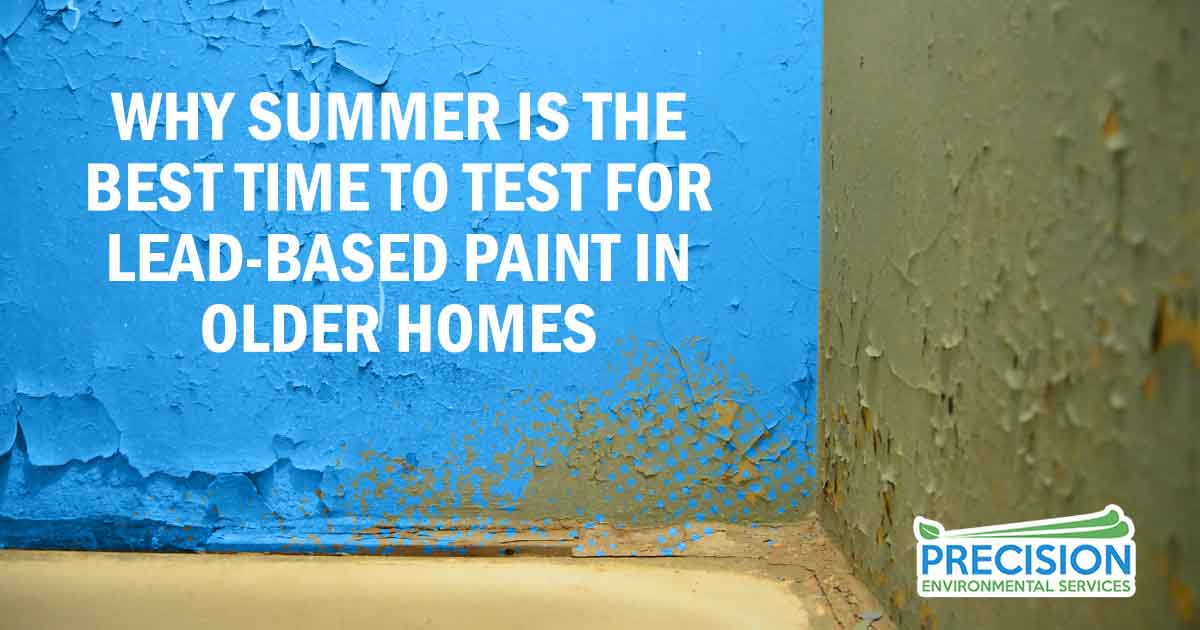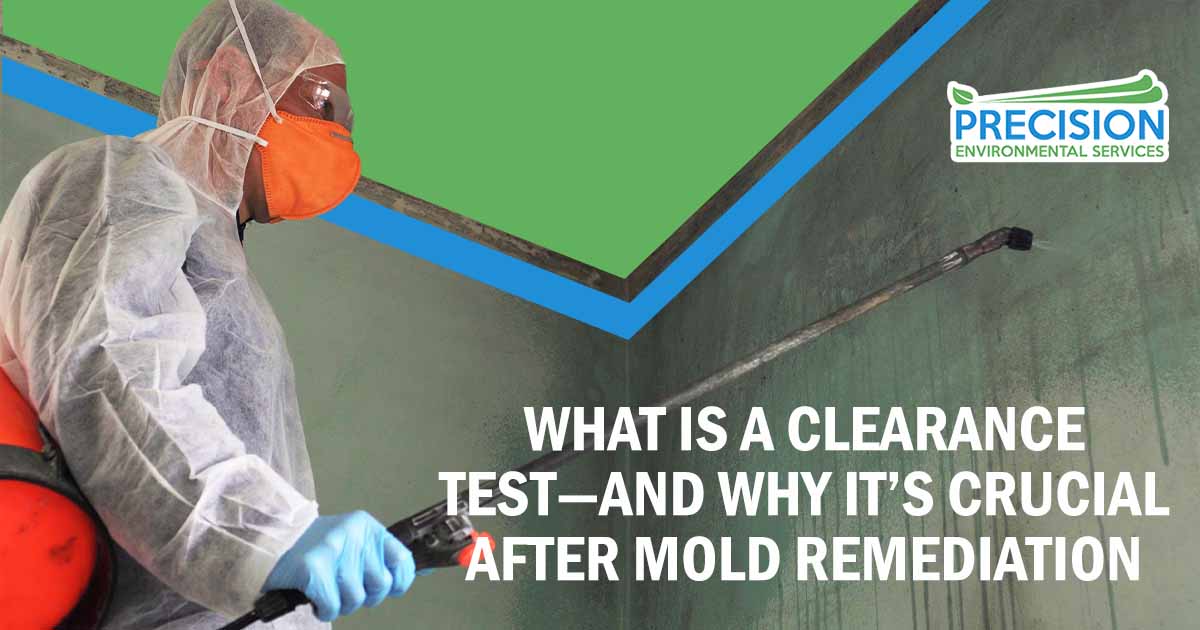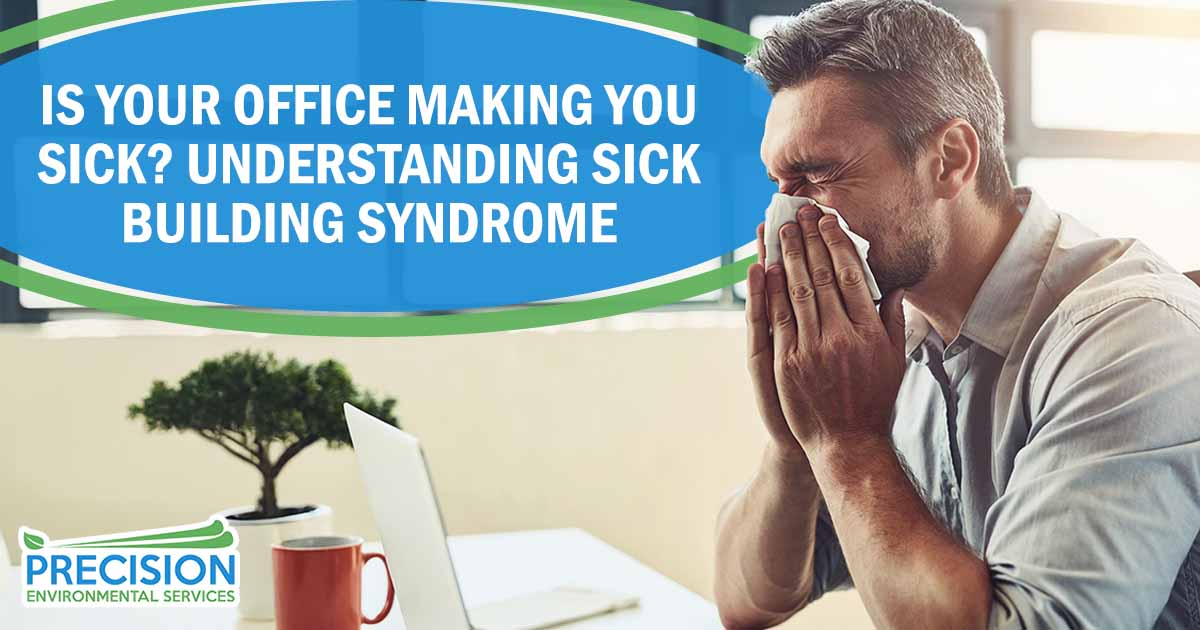Indoor Air Quality Testing Service
Get Estimate
About Our Indoor Air Quality Testing Services in DFW
It’s not uncommon for people to not spend much time thinking about their home air or the air inside the commercial buildings where they work. However, your workplaces or home’s indoor air can actually play a bigger role in health than people realize. Indoor air quality IAQ, especially in a place where you work or live, is important. Monitoring your IAQ to ensure the safety of the occupants can make a difference in their health and prevent poor indoor air quality. But if you’ve never looked into air testing, then you may not know where to start.
Precision Environmental Services takes the health of your environment seriously. Our team is dedicated to commercial and home environmental services. We work hard to test buildings for a wide range of potential contaminants and hazardous materials to create an air quality plan and prevent sick building syndrome.
Step-by-Step: Our IAQ Testing and Air Sampling Process
Our certified technicians follow a proven multi-step process to identify and evaluate indoor air pollutants. From initial assessment to air sample analysis and tailored recommendations, we take the guesswork out of improving your indoor air.
We test indoor air quality, find the source of the problem, and take the necessary management steps to ensure building occupants are safe from the risks of poor indoor air quality. Our testing services include taking an air sample from various parts of the building and sending them to an indoor air quality testing lab for analysis. From there we work with you to form an action plan for additional testing or remediation if necessary.
Why Indoor Air Quality Testing Is Important for Homes and Offices
Simply put, yes. Indoor air quality tests are important. Think about how much time you spend indoors in your home or office. Your home and workplace health can be affected by several different contaminants. An air quality test is a quick way to see if you work or live in a healthy building. Even if you work mostly outside, you should be able to go to sleep at night not having to worry about what potential toxins you may be inhaling while you sleep.
Indoor Air Quality Services offered by Precision Environmental Services at (940) 597-2673
Pre-Occupancy and Post-Construction IAQ Testing Protocols
Precision offers pre-occupancy and post-construction indoor air quality (IAQ) sampling on new construction or renovation projects. The testing procedure is performed in general accordance with Federal EPA’s “Compendium of Methods for Determination of Air Pollutants in Indoor Air”. Fixed gases are sampled using low-volume SUMMA canisters that run for a minimum of four hours and up to eight hours. The samples are then analyzed by a laboratory recognized and accredited by NELAP Texas Commission of Environmental Quality. Compounds and measurements that are typically taken during IAQ sampling are Carbon Monoxide, Carbon Dioxide, Methane, Total Volatile Organic Compounds (TVOCs), Total Particulates, Radon, Ozone, Formaldehyde,F and 4-Phenylcyclohexene.
Indoor Air Quality Testing Near Me in Fort Worth & Flower Mound
Whether you’re a homeowner in Flower Mound or managing a commercial property in Fort Worth, Precision Environmental Services is your trusted source for professional indoor air quality testing. We provide fast, reliable IAQ assessments across the Dallas-Fort Worth metroplex to help you breathe easier and meet local health standards.
Contact Precision Environmental Services at (940) 597-2673 for more information about our environmental testing services.

Air Quality Tests for Your DFW Area Home
If you’re in need of a commercial or home air quality test in the Dallas, Texas area, look no further than Precision Environmental Services. Home owners in the area turn to us for home inspections, home testing, mold remediation, asbestos testing, lead testing, and more.
Our professional staff is trained and experienced in finding indoor environmental pollutants during inspections and testing. They use this experience as they visually inspect your home or office environment while also using state-of-the-art tests. If there’s a problem, we’ll find it. We’ll also help provide solutions to those problems to make your space healthy again.
Contact Precision Environmental Services
If you’re in need with indoor air testing services, including an IAQ test, radon testing, mold inspection or mold removal, an asbestos inspection, or even just a risk assessment, we’re here to help.
If you feel you are still experiencing problems with air quality or indoor air pollutants, contact a professional. Precision Environmental Services can be reached at 940-597-2673.
How We Help You Breathe Better With Clean Indoor Air
Most people are familiar with the outdoor air quality testing cities do to keep air pollution under control. But, since many people spend a lot of time indoors, indoor air quality testing may be just as important to your health. Hiring professionals, such as Precision Environmental Services, can help you clear the air in your home or building and will help you breathe easier.
Read more about: What will indoor air quality tests tell me?
What Does an Indoor Air Quality Test Detect?
Indoor air can contain a wide range of pollutants — some visible, others completely odorless and undetectable without proper testing. These contaminants generally fall into one of three categories: biological, chemical, and combustion-related.
Formaldehyde and VOC Detection
Chemical pollutants, also known as Volatile Organic Compounds (VOCs), can come from paint, building materials, pressed wood products, furniture, or cleaning supplies. Common VOCs include formaldehyde, acetone, and freon. At high levels, these compounds can trigger allergic reactions, cause respiratory irritation, and contribute to long-term health issues.
Mold Spores and Mildew Identification
Biological pollutants come from living organisms and thrive in areas with moisture, food, or organic matter. These include mold, mildew, bacteria, dust mites, pollen, and even pet dander. Mold spores are particularly concerning for people with asthma, allergies, or weakened immune systems.
Carbon Monoxide, Radon, and Combustion Pollutants
Combustion pollutants are released when fuels are burned indoors. Carbon monoxide, radon, and nitrogen dioxide are among the most common and dangerous. Sources include gas stoves, fireplaces, tobacco smoke, and unvented furnaces. These gases are invisible, odorless, and hazardous to your health — making professional testing essential.
Asbestos and Lead Testing During IAQ Inspections
Older buildings may contain asbestos fibers or lead-based paint dust that can become airborne during renovations or as materials degrade. While not part of every air quality issue, asbestos and lead testing are critical in certain environments. Our IAQ inspections include evaluating these risks when appropriate.
In addition to these pollutants, indoor air tests may also identify elevated levels of radon, ozone, methane, total particulates, and other compounds. Our comprehensive approach ensures your home or workplace is safe, healthy, and compliant with environmental health standards.
Read more about: When should I test indoor air quality in my home?
When Should You Test the Air Quality in Your Home?
If you suspect the air inside your home has been compromised, there are at-home tests you can buy to measure certain levels of pollutants. However, using a professional service will help you not only pinpoint the poor air quality problems, but also find the source of the issues and help you resolve them. But how do you know if your home’s air quality is poor? Do indoor air quality testing to discover if there are several signs that your air could be clearer.
- Declining Health – While allergies could be linked to a change in weather or season, worsening allergies could be a result of air pollutants in your home. Since a number of factors could affect the severity of your allergies, it is important to note when your symptoms are better or worse. If you experience more intense reactions at home, but not in other outdoor or indoor environments, it could mean your home has a contaminant in the air.
Beyond allergic reactions, symptoms can become more severe if toxic contaminants are in the air. Dizziness, rashes, shortness of breath, vomiting, and muscle pain could all be signs that you have an air quality issue within your home or building.
- Environmental Changes – A number of environmental factors, indoor and outdoor, could also contribute to worsening air quality in your home or building. Pay attention to construction and nearby renovations that are in close proximity to your home or workplace. Depending on how well your home or building is ventilated, pollutants could be entering through ducts and other ventilation systems. Chemicals your neighbors use to maintain their property could also be entering the air and coming into your home or building.
In your own home or building, improvements and repairs could also make the air quality vulnerable. Old building materials can release some of the common contaminants known to decrease air quality, such as dust and mold. Some materials may also contain chemicals that could become airborne and invade the air. Indoor air quality testing can do much to tell you if contaminants are present.
- Air Distribution, ventilation and filtration – Have you noticed that some areas of your home may be warmer than others? If so, there could be a problem with airflow or the ventilation system, which has a direct impact on your overall air quality. Unusual relative humidity or dryness may also be a sign that the air quality in your home has been compromised. While a humidifier or dehumidifier, depending on your situation, can help alleviate the problem, it may not resolve what could be a larger issue.
Read more about: Why should I hire a professional to test the air quality in my home?
Why should I hire a professional to test the air quality in my home?
A number of indoor air quality testing monitors exist. However, what you potentially save in price may cost you when it comes to the accuracy of your test. Professional indoor air quality testing services, such as those provided by Precision Environmental Services, will do thorough testing for contaminants you may not be able to detect on your own.
On-site, a professional will begin by visually assessing your home, looking for any signs of mold growth or moisture. From there, the technician will collect air samples, which are then analyzed to determine the level of air quality in your home.
Preventing air quality issues in my home.
As people become more aware of how their environments affect them, indoor air quality is becoming as important of an issue as outdoor air quality. There are many benefits to ensuring that the air in your home or building is as pure as possible. For people with sensitivity to allergens, such as those suffering with asthma and other respiratory problems, will help to reduce the change of a reaction and ensure they are breathing cleaner air. Unusual smells are associated with some of the potential biological pollutants. Mildew is one of the most common smells in areas that are moist or have poor air filtration. Air quality testing can identify the problem and help solve it.
EPA Recommendations for Improving Indoor Air Quality
To prevent indoor air quality issues, the Environmental Protection Agency has several recommendations for environmental testing and indoor air quality testing:
- Remove the source of pollution. With mold and other contaminants, eliminating the source will of the problem with changing the quality of air in your home or building.
- Ventilate your home or building well. Ensuring that your air filtration systems are clear is an important step in preventing air quality issues. However, little steps, such as opening a window or door, can allow contaminants to leave your space.
- Change filters. Regularly changing the filters in your heating and air conditioning system will keep passages from becoming clogged and allowing pollutants to enter the air.
- Keep humidity under control. It is recommended that the humidity levels in your home be between 30% and 50%. To keep this in check, a humidifier or dehumidifier may help.
Call us at 940-597-2673, or use the form to request an estimate.
Call for an estimate!
940-597-2673
Latest News
Why Summer Is the Best Time to Test for Lead-Based Paint in Older Homes
Homeowners considering summer renovations should prioritize lead-based paint testing in older homes, especially those built before 1978. Disturbing...
What is a Clearance Test—and Why It’s Crucial After Mold Remediation
After completing mold remediation, one of the most important final steps is mold clearance testing. This process confirms whether the remediation...
Is Your Office Making You Sick? Understanding Sick Building Syndrome
Employees who spend hours in an office building may begin to experience recurring health issues, such as fatigue, headaches, or throat irritation....
